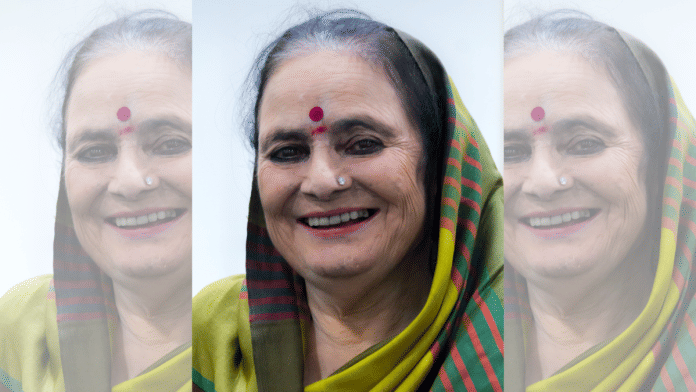Buried under Jammu and Kashmir’s troubled history lies its rich literature that few Indians know about. But if there was someone who worked their fingers to the bone in introducing J&K literature into independent India, it was Padma Sachdev.
The first modern woman poet of the Dogri language, primarily spoken in Jammu, Sachdev battled misogyny, a conservative society, chronic illness, and an unhappy marriage to emerge as one of the strongest regional literary voices in the country.
Popularly known as the ‘mother of modern Dogri’, Sachdev actually belonged to a family of Sanskrit scholars. She relentlessly fought former Prime Minister Atal Bihari Vajpayee for the recognition of her native language. When Dogri was finally introduced in the eighth Schedule of the Constitution in 2003, it was “the happiest day” for her, “as the language had its own identity and was not just taken for a dialect”.
Also read: FN Souza was a dedicated vulgarian. He never made art to please viewers
Gathering high praise
Sachdev went on to win the Sahitya Akademi Award in 1971 for her collection of poems titled Meri Kavita Mere Geet. In the preface, Hindi poet Ramdhari Singh Dinkar wrote that Sachdeva’s poetry made him want to stop writing altogether. “After reading Padma’s poems, I felt I should throw my pen away – for what Padma writes is true poetry,” he wrote in the book’s preface.
Sachdev, also a Padma Shri awardee, has written 60 books in Hindi and Dogri language. Her autobiography, titled Chitt-Chete, was awarded the prestigious Saraswati Samman in 2015, and the KK Birla Foundation, which instituted the award, had only high praise for her. In an official statement, the foundation said that “the idioms and phrases used in the over 600-page work carry the fragrance of Duggar Pradesh (J&K) and offer glimpses into the history, art, and culture of the state. The vitality of her language is a living dictionary of Dogri language”.
Borrowing from her personal experiences, Sachdev wrote about issues plaguing the Dogra society and, more importantly, its women.
One of her poems was translated into English by Karan Singh, son of Maharaja Hari Singh, the last Dogra ruler of J&K, who praised her efforts to promote the language.
“She was to the Dogri language what Mahadevi Verma was to Hindi and Amrita Pritam to Punjabi,” wrote poet Nirupama Dutt when Sachdev died on 4 August 2021.
Also read: From Galouti kebabs to the uprising of 1857—Wajid Ali Shah left an indelible mark…
A bard and a feminist
Sachdev was born on 17 April 1940 in the Purmandal area of Jammu. Her father, Jai Dev Badu, was killed during Partition. She was 16 when she recited her first poem at a mushaira in Jammu. The audience, including the CM, was extremely impressed that another Dogri poet and editor, Ved Pal Deep, published Sachdev’s poem in his local newspaper the following day. Sachdev’s writing prowess grew, and so did her relationship with Deep — the two got married in 1956 when they were 16 and 27, respectively. It led to the conservative Dogra community shunning the married couple. And thereafter followed a series of tragedies.
A few days into the marriage, Sachdev was diagnosed with tuberculosis and sent to a sanatorium for treatment. She recovered from her illness but returned home to an unhappy marriage — the couple soon filed for divorce and once again drew the ire of the conservative society.
Sachdev went on to work in All India Radio, Jammu, in 1961 as a public announcer, where she met Surinder Singh, the Hindustani vocalist of the Singh Bandhu musical duo, who was a duty officer at the time. The two got married five years later.
Keeping the legacy safe
In her short stories, Sachdev comments on inequality, the role of women in society, and domestic burdens. Her poem Mother Tongue explores the importance of holding onto one’s roots and the language. “No, I don’t work for a Shah, I said, but for a Shahni, very kind. That Shahni is my mother tongue Dogri,” reads the poem.
In her memoir titled The Nightingale of Dogri, author Anita Kanwal Slathia talks about how preserving Dogri culture was important to Sachdeva. “The people of Jammu should keep the legacy of the Dogri language and culture intact and safe in the hands of their future generations,” she wrote, quoting the poet.
Sachdev also formed a deep friendship with singer Lata Mangeshkar who sang songs she wrote in Bollywood films like Prem Parbat (1973). She also penned the lyrics for two songs for the 1978 Hindi film Aankhon Dekhi, including the famous duet Sona Re Tujhe Kaise Milun by Mohammed Rafi and Sulakshana Pandit.
“She was a bard for Dogri. She converted, codified, and rewrote Dogri’s oral literature, bringing out its classical grandeur in an inter-textual manner,” Hindi poet Anamika told The Times of India in 2021.
(Edited by Humra Laeeq)






